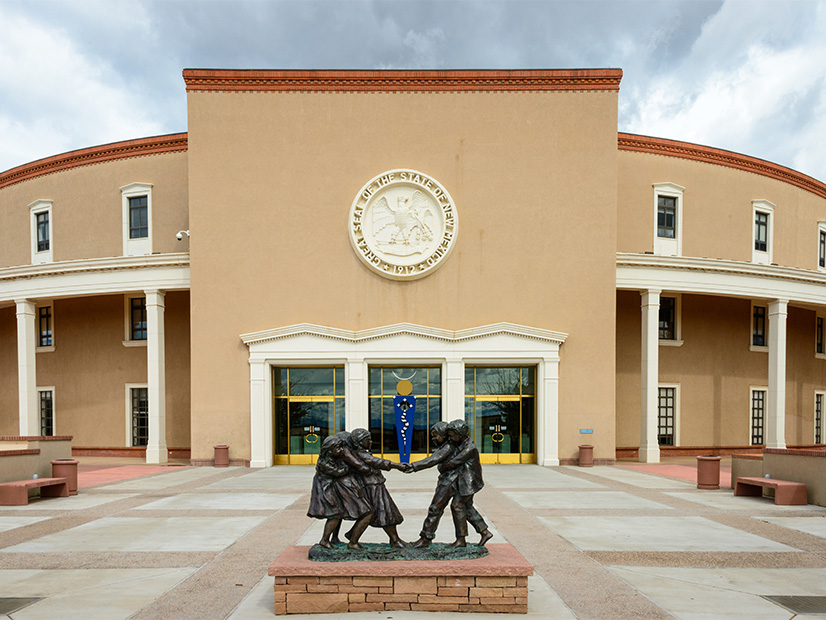A net zero bill unveiled by New Mexico lawmakers last week has stumbled, failing to advance out of a Senate committee on Tuesday.
Senate Bill 520, sponsored by Sen. Mimi Stewart (D), calls for the state’s direct greenhouse gas emissions to be reduced to 90% below 2005 levels by 2050. Interim GHG reduction targets in the bill are 50% by 2030 and 75% by 2040.
An earlier version of the bill included a requirement to offset remaining GHG emissions in 2050 and beyond. The bill’s authors decided to leave offsets, and a system for managing them, as a topic for future legislation.
But SB 520 may now be dead after the Senate Conservation Committee failed to advance it. A motion to pass the bill failed on a 4-4 vote. One committee member was absent.
The committee potentially could revive the bill by bringing it back for another vote. New Mexico’s 60-day legislative session ends at noon on March 18.
The committee’s three Republican members voted against the bill and were joined by Sen. Joseph Cervantes (D).
Cervantes criticized the bill for its lack of consequences for not meeting the GHG reduction targets.
“There’s no accountability in here at all,” he said.
“If we really want to do things, let’s do things,” Cervantes said. “Let’s give meaningful standards, and let’s give consequences, and let’s give clear direction.”
Stewart, the bill sponsor, said that even though the bill didn’t have “huge accountability,” it was an important step. SB 520 would codify GHG reduction targets outlined in a 2019 executive order from Gov. Michelle Lujan Grisham. The bill “sets an essential framework for our continued climate action,” Stewart said.
“It tells agencies, and the industries, and the communities about the clarity and the consistency that we’re going to need to plan long-term to meet these goals,” she said.
Sen. David Gallegos (R) expressed concern that the bill’s requirements would cause businesses to leave the state. That could be an issue, especially along the state’s eastern border with Texas, he said.
“If they move to Texas, I don’t think we resolve emissions issues,” Gallegos said.
Clean Future Act
Stewart filed SB 520 on Feb. 16, the last day for introducing legislation The initial version of the bill was essentially a blank placeholder. Net zero language was added in a Senate Conservation Committee substitute version posted last week.
SB 520 is similar to House Bill 6, a net zero-bill that stalled during the 2022 legislative session. (See NM Climate Activists Vow to Try Again on Net Zero Bill.) Both bills are known as the Clean Future Act.
Stewart said various groups had been working with the governor’s office on the bill for nearly the last year. But the efforts broke off due to disagreement among groups. As a result, SB 520 is less comprehensive than it could have been, she said.
In addition to the GHG reduction targets, SB 520 would codify the methane waste rule recently promulgated by the state’s Oil Conservation Division. It would instruct state agencies to apply climate equity principles when developing policies and rules.
There would also be requirements for state agencies to report on GHG emissions from sectors under their control and progress made toward meeting reduction targets.
‘A Real Problem’
Representatives of several conservation groups, including Conservation Voters of New Mexico and Western Resource Advocates, spoke in support of SB 520 during Tuesday’s hearing.
Representatives of groups including the New Mexico Farm and Livestock Bureau, the Independent Petroleum Association of New Mexico and the New Mexico Chamber of Commerce spoke in opposition.
Camilla Feibelman, director of the Sierra Club: Rio Grande Chapter, said after the committee hearing that the vote was a disappointment.
The bill “would have been a strong step forward” and would have laid the groundwork for the New Mexico Environment Department to begin rulemaking to help address climate change, Feibelman told NetZero Insider.
Residents are still recovering from the state’s recent fires and floods, which are a clear illustration of climate change, Feibelman said.
“Failure to move a comprehensive climate bill forward is a real problem,” she said.




